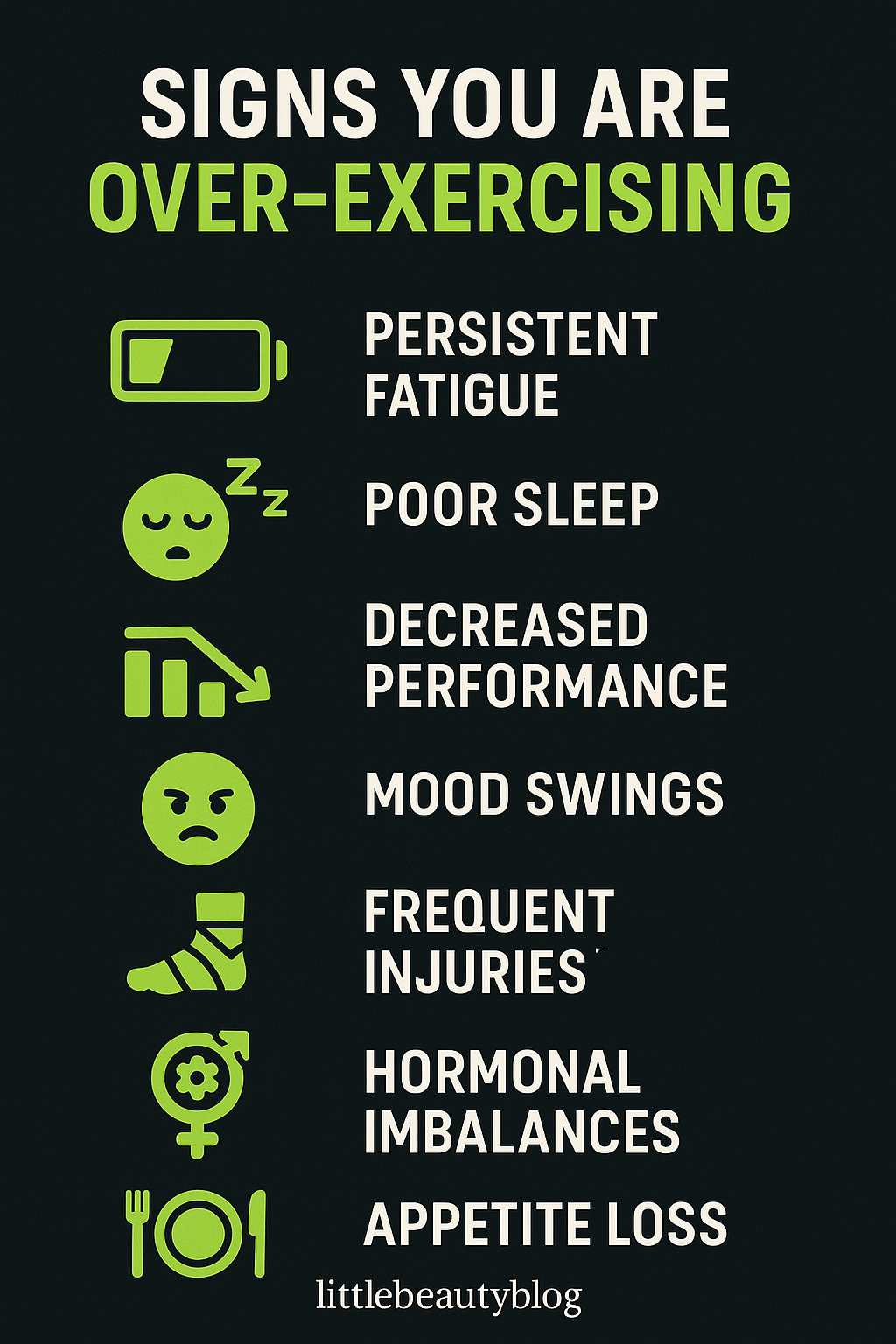What are the signs you are over exercising? In a world that glorifies hustle culture and intense fitness routines, it’s easy to believe that more exercise equals more progress. But when your body starts sending distress signals, it’s time to pause and listen. Overtraining doesn’t just stall your fitness gains—it can sabotage your health, disrupt your hormones, and even lead to long-term injury.
If you’ve been asking “How do I know if I’m working out too much?” or “What happens if you exercise too much every day?”, this article covers the most common symptoms of over-exercising, and how to adjust your routine for a more balanced, sustainable lifestyle.
🚩 1. Persistent Fatigue That Doesn’t Go Away
Feeling tired after a workout is normal. But if you’re experiencing chronic fatigue that doesn’t improve with rest, it could be a major red flag. Your body needs time to recover and rebuild after physical exertion. Overtraining depletes your energy stores and prevents full recovery, often leading to a constant feeling of exhaustion—even on rest days.
😴 2. Poor Sleep Quality or Insomnia
One of the overlooked signs of overtraining in fitness is sleep disruption. While moderate exercise improves sleep, overdoing it can increase cortisol levels—your body’s primary stress hormone—making it harder to fall asleep or stay asleep. If you’re waking up multiple times a night or feeling unrested in the morning, it might be time to reduce intensity.

📉 3. Decreased Performance and Plateaus
You’d expect that more training leads to better results, right? But when you cross the threshold into over-exercising, your performance actually suffers. You may notice:
- Slower recovery time
- Reduced strength or endurance
- Difficulty completing your usual workouts
This is one of the most searched signs of overtraining in gym workouts, especially among athletes and fitness enthusiasts chasing quick gains.
🧠 4. Mood Swings, Irritability, or Anxiety
Mental health is deeply connected to physical health. One of the early psychological signs of over exercising is a shift in mood. You may feel more anxious, frustrated, or emotionally unstable. Excessive training can lower serotonin and dopamine levels, both essential for mental balance.
🦴 5. Frequent Injuries or Joint Pain
Your body rebuilds muscle and tissue during rest—not during the actual workout. Over-exercising increases your risk of:
- Stress fractures
- Tendonitis
- Chronic muscle soreness
- Joint inflammation
This is especially common in high-impact routines or when doing intense cardio daily without rest days.
🩸 6. Hormonal Imbalances and Menstrual Changes
For women, missing periods or irregular menstrual cycles can be a sign of overtraining, especially when combined with caloric restriction. For both men and women, changes in libido, unexplained weight loss, or trouble gaining muscle can be related to disrupted hormone levels caused by excessive exercise.

🍽️ 7. Appetite Loss or Overeating
Ironically, exercising too much can mess with your appetite. Some people experience a reduced desire to eat, while others develop cravings for sugar or processed carbs as the body searches for quick energy. Both are signs that your body’s energy regulation systems are off balance.

📝 How to Recover from Over Exercising
Recognizing the signs is the first step. Here’s what to do next:
- Take 2–5 full rest days, or do only light activity like walking or stretching.
- Prioritize sleep and hydrate well.
- Eat nutrient-dense meals with plenty of protein, complex carbs, and healthy fats.
- Reduce training volume when you return—start with 60–70% of your normal routine.
- Consult a fitness coach or physician if symptoms persist.
💬 Final Thoughts
So, what are the signs you are over-exercising? From fatigue and poor sleep to injury and mood changes, the symptoms can creep in quietly—but they can’t be ignored. Your body isn’t a machine, and even elite athletes schedule recovery days. The key to long-term success in fitness isn’t just about training hard—it’s about training smart.
Listen to your body, adjust your routine, and give yourself permission to rest. Because sometimes, doing less is exactly what your body needs to do more.

This article is for informational purposes only. This article is not, nor is it intended to be, a substitute for professional medical advice, diagnosis, or treatment and should never be relied upon for specific medical advice.This article is the views of the expert and does not necessarily represent the view of Little Beauty Blog.
